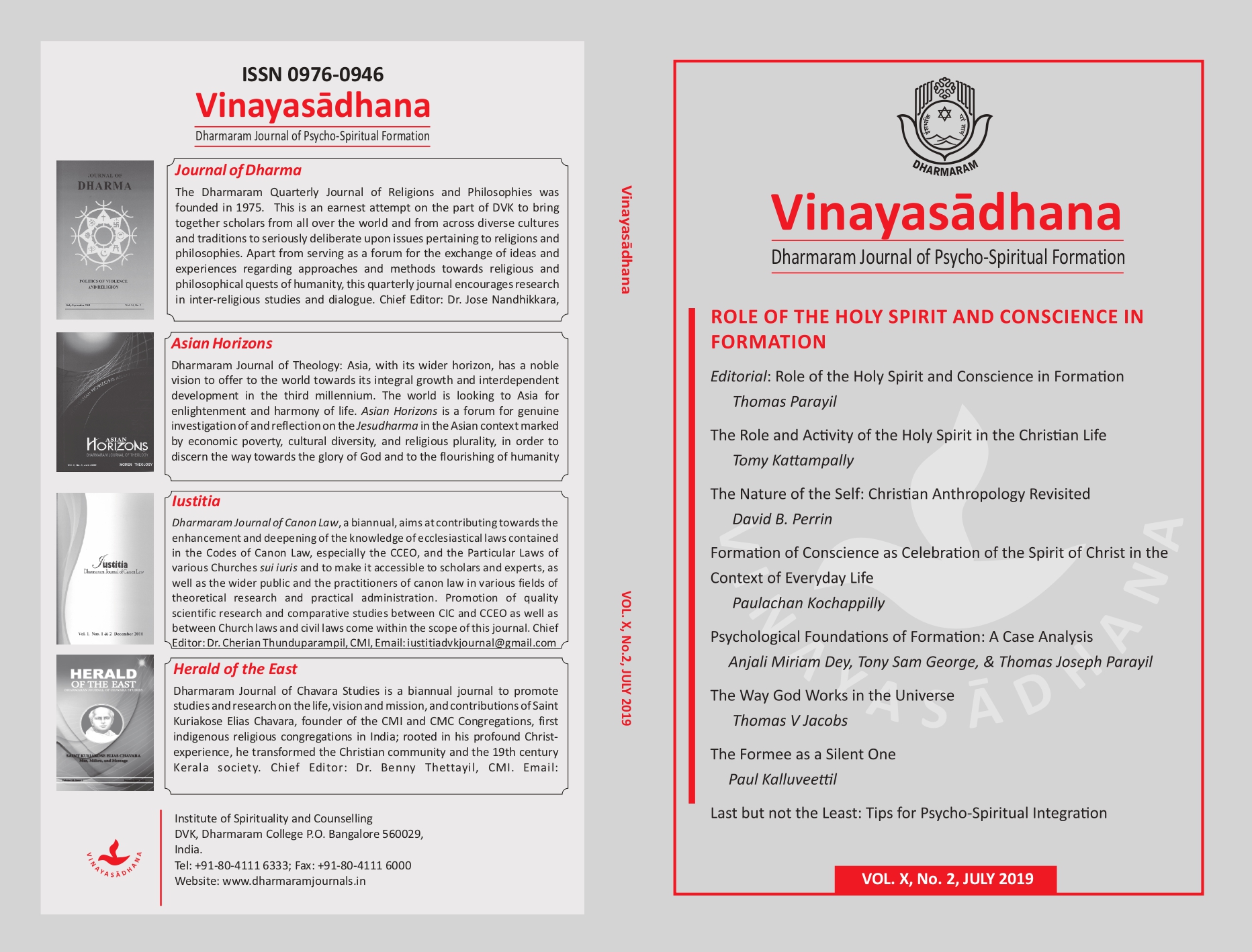The Nature of the Self
Christian Anthropology Revisited
Keywords:
Body self, Narrative self, Transcendental self, Self-knowledge, Christian anthropologyAbstract
The word “self” comes up frequently in everyday language. We talk about “self-respect,” “myself,” “self-determination,” “self-help,” “yourself,” “him/herself,” and so on. All of these expressions refer to the subject of investigation of anthropology: the human person and what it means to be human. Thus, in everyday languagewhen we refer to “self” or “person” or “human being,” often we are referring to the same reality. What is the nature of the self that we so often mention in everyday language? This article takes a critical look from multiple perspectives at the concept of “the self” to understand its deeper meaning in everyday language use and in Christian anthropology.
References
Ahlgren, G. T.W. (2005). Julian of Norwich’s Theology of Eros, Spiritus: A journal of Christian spirituality,5(1), 37-53.
Bourgeois, W. (2003). Persons: What philosophers say about you (2nd ed.). Waterloo, ON: Wilfrid Laurier University Press.
Descartes, R. (1639). Meditations on first philosophy in which are demonstrated the existence of God and the distinction between the human soul and the body (J. Cottingham, Trans.). Retrieved from https://www.marxists.org/reference/archive/descartes/1639/meditations.htm
Destro, A., & Mauro, P. (1998). Self, identity, and body in Paul and John. In A.I. Baumgarten, J. Assmann, G. G. Stroumsa, (Eds.), Self, soul and body in religious experience. Leiden: Brill, 184-197.
Dupré, L. K. (1976). Transcendent Selfhood: The loss and rediscovery of the inner life. New York: Seabury Press.
Grenz, S. J. (2001). The social God and the relational self: A Trinitarian Theology of the Imago Dei. Louisville, Kentucky: Westminster John Knox Press.
Helminiak, D. A. (1987). Four viewpoints on the human: A conceptual schema for interdisciplinary studies: II. The Heythrop Journal XXVIII/1, 1 - 15.
Jopling, D. A. (2000). Self-knowledge and the self. New York: Routledge.
Lakoff, G. (1997). The internal structure of the self. In U. Neisser, & D. A.
Jopling (Eds.), The Emory symposia in cognition. The conceptual self in context: Culture, experience, self-understanding, New York, NY: Cambridge University Press, 92-113.
McGuire, M. B. (2003). Why bodies matter: A sociological reflection on spirituality and materiality. Spiritus, 3(1), 1 - 18.
Mischel, T. (Ed.). (1977). The Self: Psychological and philosophical issues. Oxford: Basil Blackwell.
Modell, A. H. (1993). The private self. Cambridge, Mass.: Harvard University Press.
Neisser, U., & David A. J. (Ed.). (1997). The conceptual self in context: Culture, experience, self-understanding. Cambridge, U.K.: Cambridge University Press.
Paulsell, S. (2002). Honoring the body: Meditations on a Christian practice. San Francisco: Jossey-Bass Wiley Imprint.
Perrin, D. (2007). Studying Christian spirituality. New York, NY: Routledge.
Perrin, D. (2018a). Stories, hermeneutics and maturation in Christian Life. Vinayasādhana: Dharmaram Journal of Psycho-Spiritual Formation, 9(1), 35-57.
Perrin, D. (2018b). Mimesis. Studies in spirituality, 28, 85-115.
Perrin, D. (Ed.). (2001). Women Christian mystics speak to our times. Franklin, WI: Sheed & Ward.
Reiss, T. J. (2003). Mirages of the selfe: Patterns of personhood in ancient and early modern Europe. Stanford, CA: Stanford University Press.
Ricoeur, P. (1984). Time and narrative: Threefold mimesis. Time and Narrative, 1, 52–87.
Ryan, T. (Ed.). (2004). Reclaiming the body in Christian spirituality. New York: Paulist Press.
Synnott, A. (1997). The body social: Symbolism, self, and society. London: Routledge.
Taylor, C. (1989). Sources of the self: The making of the modern identity. Cambridge, Mass.: Harvard University Press.
Taylor, C. (2007). A Secular Age. Cambridge, Mass.: Harvard University Press.
Timmerman, J. H. (1994). The Sexuality of Jesus and the Human Vocation. In J. B. Nelson, & S. P. Longfellow (Eds.), Sexuality and the Sacred: Sources for Theological Reflection. Louisville, Kentucky: Westminster/John Knox Press, 91-104.
Williams, R. (1996). The Body’s Grace. In C. Hefling (Ed.), Our Selves, Our Souls & Bodies: Sexuality and the Household of God. Cambridge, MA: Cowley Publications, 58-68.


